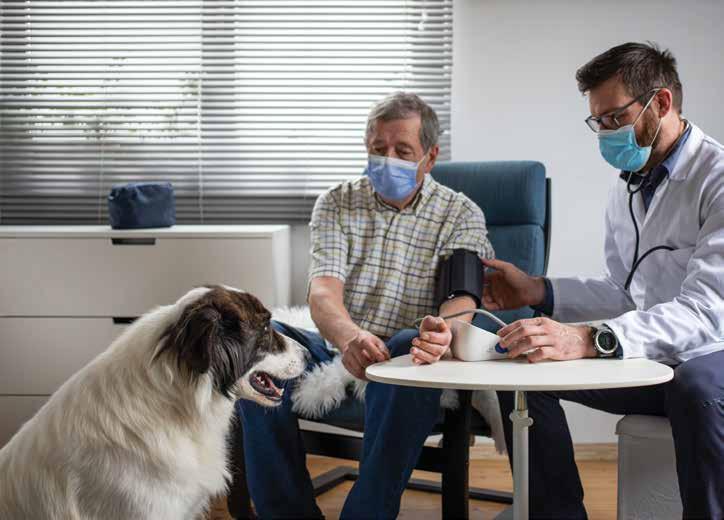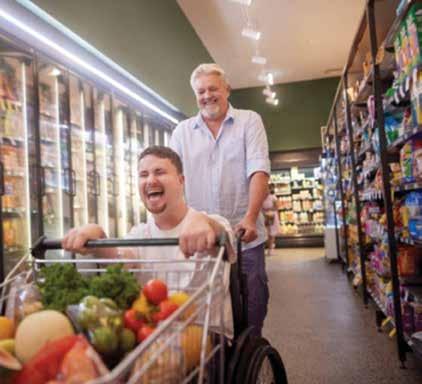
5 minute read
A Health & Wellness
Why pet therapy is so good for us
In Australia, seniors everywhere are turning to pet therapy to reap a number of mental and physical health benefits.
Advertisement
Research shows that seniors who interact with animals experience decreased levels of stress and depression, improved immunity and lower blood pressure.
Research has shown that seniors who interact with animals experience decreased levels of stress and depression, improved immunity, lower blood pressure, increased ability to complete daily activities, improved communication abilities as well as enhanced quality of life.
One of the main reasons for the latter could be attributed to the socialisation aspect – seniors can not only connect with a therapy pet but often form relationships with other seniors through animals. While long-term care is important for seniors, initiatives such as pet therapy can greatly contribute to the physical, mental and emotional well-being of those living in Australia’s care facilities.
Because seniors need care plans that cover all components of their physical and mental wellbeing, introducing them to pet therapy is an effective way to ensure they live healthier lives with assistance from companions that ease both pain and stress.
Three essential health factors
Pet therapy can bring seniors an array of physical benefits that have far-reaching implications for their overall health and wellbeing.
Let’s have a look at why improving these health factors is so beneficial… 1
Lower blood pressure. Keeping healthy blood pressure levels is both an achievable goal and an important means of protecting overall health. High blood pressure affects seniors differently than younger people, so it is important to take extra steps to have it under control. In addition to living a healthier lifestyle by eating more vegetables and exercising more often, seniors should consider speaking with their healthcare providers about additional measures they can take to lower their blood pressure. With the right care plan that is tailored to their specific needs, seniors can help keep their blood pressure in check for years to come. 2 countless benefits including improved health and greater social interaction as well as a reduced risk of falls – all of which contribute to maintaining overall wellbeing.
The next steps
If you are a senior living in Australia looking for pet therapy to help improve your physical and mental wellbeing, contact your doctor or carer today to learn more about the different options available. Pet therapy is an excellent way to reduce stress, ease pain and enjoy a healthier quality of life. ACG
Improved cardiovascular health. Heart disease is the number one cause of death worldwide. But there’s much you can do to improve your heart health.
According to the Australian Heart Foundation, regular physical activity is essential. Increasing your physical movement from as little as 10 minutes a day to the Australian Government’s recommended 30-45 minutes a day, five or more days of the week, can help reduce your risk of heart disease and heart attacks. Taking regular long walks with your pet therapy dog is one way of doing that. 3
Increased strength, mobility and balance. As we age, strength, mobility and balance can be affected, so seniors in Australia need to be aware that there are options available to decrease this decline and stay healthy longer. Strength-training exercises can help seniors improve their balance while regular aerobic activity increases mobility; both are critical requirements for seniors who want to remain active and independent members of their community. Integration of such activities into an older person’s life can have
Owning a pet has plenty of benefits, too
It’s not just pet therapy that has a multitude of benefits. Research shows that seniors who own pets experience lower blood pressure and cholesterol levels, improved cardiovascular health and increased energy levels, as well as better sleep quality – all essential to good physical health.
What’s more, having a companion animal encourages seniors to be more socially engaged and get out and about in the community. Research has even linked better recovery from some medical procedures with pet companionship. This is especially true for life-altering medical events such as surgery or hospitalisation.
While owning a pet can have many positive benefits, it is important to consider the potential risks involved.
Ageing pets may require more care and attention than younger animals, and there may be safety concerns such as falls or injuries with an animal around. Additionally, seniors with allergies or asthma may be adversely affected by pets in the home.
Gary cares for his stepson, Ryan, who was born with Cerebral Palsy. When he’s not providing care to Ryan, at work, or spending time with his wife and other children, Gary can be found hanging out on his Harley Davidson.
Happiness in helping
Providing joy and support to others was something Gary was familiar with before he became an unpaid carer. After moving to Sydney as a young man, Gary bought his first Harley Davidson and joined a riding group. The group visited a children’s hospital weekly to take children living with disability for motorbike rides.
It was at one of the hospital’s Christmas events that Gary met his future wife, who at the time had two sons – her youngest was Ryan.
“My wife and I had many conversations about what caring for Ryan would be like and how it would affect my life. I understood it was a big responsibility, but it was something I was willing to take on. I wouldn’t change anything,” said Gary.
The joys of being a Carer
A self-proclaimed clown, Gary loves joking around with Ryan. “Inside that body is a really active mind,” said Gary.
Merriness and motorcycles are common when Gary and Ryan spend time together. Whether they’re wiping down the bike in the garage or hitting the road, it’s the quality time spent together that brings both immense joy.
“For me, the biggest reward is knowing I’ve helped change Ryan’s life. Because, let’s be honest, one day I won’t be here, but I know I’ve done some good and I’ve helped him. That’s my reward.”
When the going gets tough…
Sometimes the day-to-day tasks that Gary takes on can be daunting. For example, a simple trip to the shops now includes carrying Ryan into the car, getting him strapped in and making sure he’s gone to the bathroom or has a drink with him.
“In the time someone else would have gone to get the milk and come back, we’re still getting ready,” said Gary.
Inaccessible places also limit the experiences the whole family can share together. A visit to Bali, before footpaths were common, meant that Gary and the family were lifting Ryan and his wheelchair over kerbs and around obstacles constantly. This, paired with a lack of accessibility at the hotel, left Gary with a back injury. The whole experience has stopped the family from taking more trips like this.
“People often ask me ‘how do you cope?’ and I respond with, ‘Ryan is rewarding. There are days when I come home from work, and you know life can get you down and be tough, but I look at him and despite it all, he’s smiling and he’s happy’. It helps you to appreciate what you have,” said Gary.
Gary also worries about the future for Ryan. “I’m sixty, soon I’m going to be seventy. Sometimes, I worry about how we’re going to cope. We don’t worry about ourselves, it’s a daily worry about what’s going to happen to Ryan.”
Calling on Carer Gateway
Like 80% of unpaid Carers across Australia, Gary and his family value assistance from Carer Gateway to navigate services available to them as carers. Emotional support and safe respite options are valuable support services for Gary.

“Through Carer Gateway our family can also connect to a community of people who understand what we’re going through as parents and Carers,” says Gary.
Carers SA is the lead agency for supporting Carers in South Australia and is the Carer Gateway Provider.




